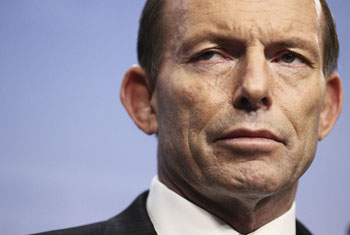Presidential race closely monitored by Australia: report
January 2, 2015 10:12 am
Australian officials are carefully watching Sri Lanka’s surprisingly close presidential election, uneasy about how a change of government might affect joint action to stop asylum seekers’ boats.
But human rights advocates have urged the Abbott government to cease its “unquestioning” support for President Mahinda Rajapaksa and push for an international investigation into claims of war crimes during the country’s civil war.
Mr Rajapaksa has called an early election for January 8, two years ahead of schedule, having successfully changed the country’s constitution to allow him to run for a third term.
But the defection of a one-time political confidante and former health minister Maithripala Sirisena to become the opposition candidate has resulted in an unexpectedly tight race.
“It is a contest,” said Paikiasothy Saravanamuttu, a Colombo-based political analyst.
The opposition has sought to exploit corruption and nepotism allegations that have dogged Mr Rajapaksa, with his extended family accused of now controlling almost two-thirds of the national budget.
A minority Muslim party switched sides this week to join the opposition.
But Mr Rajapaksa is also hailed as hero by many in the country’s Sinhalese majority for finally ending the decades-long war with the separatist Tamil Tigers.
Australia has forged close ties with the Rajapaksa government since 2009, when hundreds of ethnic Tamils fled Sri Lanka by boat, amid estimates the fighting killed as many as 40,000 people. The Abbott government and its Labor predecessor have both praised Sri Lanka for its cooperation in stopping people smugglers, increasing ties between immigration officials and police and donating the country navy vessels.
Australia also sided with Sri Lanka in March against setting up a United Nations inquiry into allegations of war crimes in the last months of the civil war.
Phil Lynch from the Geneva-based International Service for Human Rights said Australia had taken a “misguided approach to ‘stopping the boats’, which actually involved close cooperation with alleged war criminals”. He said whatever the composition of the next Sri Lankan government, Australia should be guided by a commitment to human rights and the rule of law.
Sri Lanka’s opposition has pledged a fresh inquiry into the war crimes claims - a promise now matched by Mr Rajapaksa - but ties with Australia have not become a political issue.
Yet relations with China have been much debated, with neighbouring India wary of Chinese warships docking in Sri Lanka’s ports - ports built with loans from Beijing.
Sudha Ramachandran, an analyst on South Asia political and security issues based in Bangalore, said Mr Sirisena had a fair chance of winning if the elections are free and fair.
“Until recently it seemed that Rajapaksa was invincible but Sirisena’s candidature has changed that as he will split the Sinhala majority and win much of the Tamil and Muslim votes,” Dr Ramachandran said.
But there is also concern Mr Rajapaksa may not accept the result, fearing retribution over corruption allegations.
The elections will be monitored by international delegations from the Commonwealth and other regional forums. – The Sydney Morning Herald












